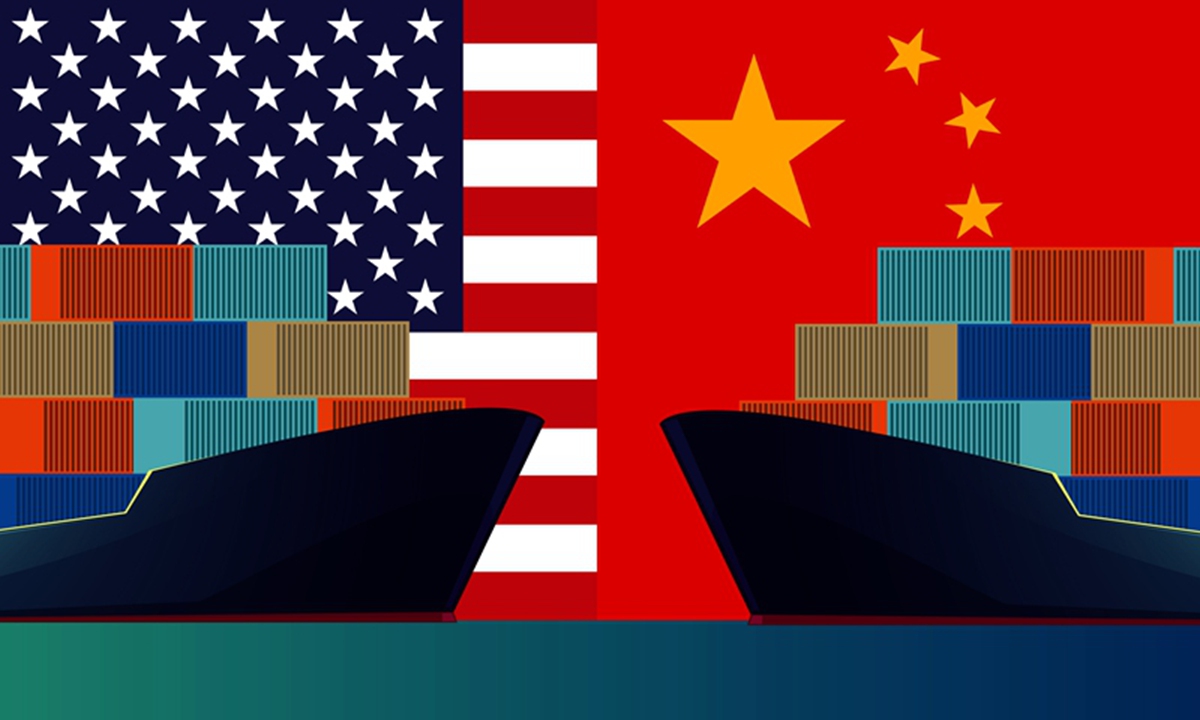COMMENTS / EXPERT ASSESSMENT
Damage to global value chains by US trade war worth reflecting on

China US Photo: GT
The US' brutal trade war against China has undone three to five years worth of growth among global value chains in affected countries, according to a report from the United Nations Development Programme, Bloomberg reported.Lingering tariffs on billions of dollars of goods under the trade war waged by former US President Donald Trump is still causing severe damage to trade within supply lines, the report said, adding that the shocks have been amplified by the disruption caused by the COVID-19 pandemic.
Looking at the post-pandemic future of global value chains, a certain degree of restoration addressing adjustments or interruptions that were forced by pandemic restriction measures is likely to be made amid economic recovery. However, a larger part of the overall impact, which is caused by political interference from US-led clique, is unlikely to be repaired.
On high-tech front, the Biden administration is still emphasizing competition and decoupling, over cooperation. Aside from seeking to restore its historical dominance in key technologies, the US and European countries continue to attempt to bring manufacturing of core parts back to the regions they can control. This will cause significant impacts on layout of the modern industrial chain in foreseeable future.
Therefore, from China's perspective, we should be cautious about the restructuring and decoupling of high-tech industries driven by the US. Although this process does not occur very quickly, over time, some of the potential impacts become increasingly apparent.
The structure of the current global industrial chain - mainly based on traditional manufacturing - took through 5 to 10 years to put in place. With new industrial supply chains centering around advanced technology, it remains to be seen how will this round of the US-led industrial chain relocation will bear fruit.
If the US plans to push a politically driven industrial chain restructure, it will violate the objective laws of the free-market economics. Such an industrial chain refactoring would be contrary to market and enterprise choice.
Some of the traditional manufacturing industry's layout was established on complementary advantages, which may be difficult to change course on. For instance, in some aspects of machinery manufacturing and other specialized sectors, China's manufacturing advantages are still very obvious. In these respects, it is very difficult for the Western countries to move production back to their own domestic markets.
Given various of factors are not completely controlled by the small group of countries led by the US, when these tectonic changes occur, it is possible to cause a long-term unbalance between the supply and demand, or some new contradictions will emerge.
Encouraging high-end manufacturing to return to the US or move out China is obviously contrary to market laws, yet Biden seems to be ready to junk long-held principles for the sake of winning political points.
On the trade front, instead of making overdue correction to Trump's China tariffs, Biden administration recently announced that it will set up "strike force" to go after China on trade. If the US still cannot look objectively at competition with China and take more measures that harm others without benefiting itself, the result could be a drag on its own economic growth or undermine its own competitiveness.
The author is a vice chairman of the China Society for World Trade Organization Studies in Beijing, and former president of the research institute of China's Ministry of Commerce. bizopinion@globaltimes.com.cn


